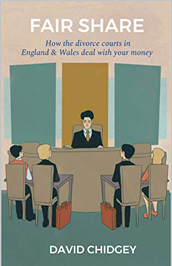Tricky Business: How Do You Work Out What The Family Business Is Worth?

- This blog contains affiliate links, which we may receive a commission for purchases. The decision is yours, whether or not you decide to buy.
Divorce, whatever the circumstances, can be a tricky business but when a family or one of the partners runs their own business, things can be even more complicated. One of the first stumbling blocks is working out an accurate valuation of the business. You cannot look at the division of a business without an understanding of its value.
So, we asked Mark Heppinstall from the Stowe Family Law office in Ilkley, who is regularly instructed by business owners, or the spouses of business owners, to join us to explain the best way to get an accurate valuation.
“I am often asked by my clients whether there is a need to have any sole or shared business valued in the event of a divorce or separation. To answer this, people need to understand that a business is something that can be considered by the Court as one of the financial resources that are available in a case, irrespective of whether the business is considered a matrimonial or non-matrimonial resource.
How to value a business
If a valuation is needed, in matrimonial cases it will usually be undertaken by a single joint expert acting on behalf of both parties. However, before instructing an expert, there are certain steps that should be taken first. There should be consideration of full business accounts for the last two financial years, which applies to sole traders as much as it does to partnerships, LLP’s or shareholders in limited companies.
If a business is incorporated, abbreviated accounts can often be accessed online from Companies House. This contains easily accessible information that either party can review digitally at the touch of a button. Whilst a useful overview, these are no replacement for full company accounts, which are usually much more informative and should include the full profit and loss account, balance sheet, detailed notes to the accounts and reports on behalf of the accountants and directors.
This information gives more context to the performance of a business than publicly accessible abbreviated accounts. Unsurprisingly, abbreviated accounts tend to be more concise and therefore might only tell part of the story. A word of caution, it is worth bearing in mind that by the time business accounts or financial statements are available the data may be historic and could be out of date. Therefore, it is worth cross-checking this information against more current management accounts.
This can help give both parties more confidence in a valuation and enable them to make more informed decisions without the need to instruct an expert. Additionally, if I am acting for a client who has an interest in a business, I often advise them to obtain a letter from their accountant to comment upon its value, which can assist in narrowing the issues in dispute.
This can really help, although the flip side is that the spouse may be wary about relying on a company accountant’s valuation unless there is corroborating evidence from a single joint expert. Nevertheless it can help to explain how the valuation of the client’s interest in the business has been assessed.
I commonly see this if there is disagreement about how the business has been valued, or in cases where a spouse is less familiar with the business, which sometimes means they have less confidence in the accountant’s interpretation of its value.
If you cannot agree, how can the court help?
In most cases, after taking the above steps it is possible for an agreement on valuation to be reached. However, where this is not possible, the Court’s expectation is that expert evidence should be considered from a single joint expert instructed by both parties.
The question for the Court is whether it is necessary to instruct an expert. If the Court is satisfied that an expert should be instructed, common practice is to instruct an independent accountant with no prior knowledge of the company in question. Although it would be expected that they should have sufficient knowledge of the market or sector in which the business operates.
Strictly speaking, there is no mandatory requirement for the Court’s permission to be obtained before an expert is instructed. However, permission is needed before expert evidence can be put before the Court. If there is a dispute about whether to instruct an expert, this should be addressed at an early stage in a Court timetable and ideally no later than the first hearing.
The Court will weigh up the cost and delay of instructing an expert against the potential value of a party’s interest in the business and the relevance of this in the context of the other matrimonial assets available. The scope of an expert’s instruction should be carefully considered and could include the value of a spouse’s interest in a business, the extent to which this value is realisable (i.e. liquidity), the future maintainable income of the business and any tax consequences associated with a sale or disposition.
I often remind my client’s that the value of a business should be treated with caution and it is not realistic to compare a business valuation to property or other matrimonial assets. Property is generally easier to value, easier to sell and convert to liquid capital and therefore more readily realisable.
Business valuations are generally more uncertain, there is greater potential for change, they are typically regarded as more risk-laden and the sale of a business might affect a party’s earning capacity or future income; unlike the sale of a property.
The bigger financial picture
In view of this, clients should bear in mind that it can be misleading to treat a spouse’s interest in a business as a capital asset in isolation. Sometimes, it makes more sense to consider the income a spouse can draw from a business, which can be relevant when considering maintenance. Maintenance that could well be guillotined if a client was forced to sell their interest in a business to realise it’s capital value.
What is clear is that there is no one size fits all approach and each case will be based on its own facts. Sometimes a valuation from a single joint expert can really help, but all too often parties can jump to this starting point without first taking sensible and proportionate steps to consider whether this is necessary.”
This article originally appeared on the Stowe Family Law Blog
You may also like
Books
Buy now from Amazon
- The Co-Parenting Handbook
- Fair Share: How the divorce courts in England & Wales deal with your money
- The Book You Wish Your Parents Had Read THE #1 SUNDAY TIMES BESTSELLER
Podcast
This personal finance podcast is for women, including female entrepreneurs to learn personal finance, money mindset & practical money management tips to be financially confident. To get in control of money, to budget, gain financial confidence, learn how to invest, save money & manage money mindset and behaviours. Hosted by a multi- award winning qualified financial planner and financial coach.
- Listen to the In Her Financial Shoes Podcast
- Catherine Morgan full profile
- More professional podcasts
Articles
- 8 Ways You Can Stay Financially Fit After Your Divorce
- Five Things To Let Go Of After Divorce
- Buying A Home Post Divorce Part 1
Videos
Practical advice and tips from professionals on what to do with issues and challenges around divorce from parenting to finance.
Events
Practical tips & advice designed to help people going through divorce, whether online or in person.
Useful links
Here's a selection of organistaioins from parenting to finance to help you with your divorce.
Legal professionals
Related Posts
-

What Is A Clean Break Order In UK Divorce? FAQs On Financial Settlements
-

Financial Management Strategies for Stepfamilies
-

8 Ways You Can Stay Financially Fit After Your Divorce
-

Are Private Financial Dispute Resolution Hearings Necessary For Divorcing Couples In These Uncertain Times?
-

How Are Finances Divided On Divorce?

.jpg)





.jpg)

